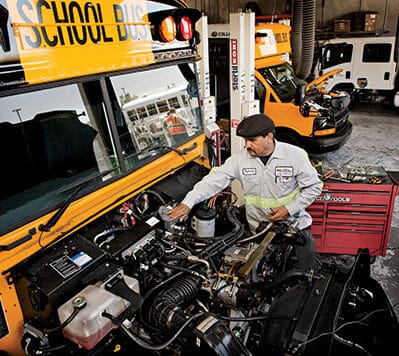Funding Options for Propane School Buses
School administrators throughout Missouri and across the country are making a change to benefit their students, their school districts, and the environment. They are switching to propane-powered buses to save money, reduce emissions and protect student health.
The benefits of propane over diesel fuel are numerous, as shown in several case studies from school districts around the country. Currently, more than 900 school districts nationwide transport more than one million kids to and from school every day. Your district can be a part of this movement by taking advantage of the funding provided through the state’s Volkswagen Environmental Mitigation Trust Fund.
The state of Missouri has received $42 million from the Volkswagen emissions settlement to fund transportation projects that reduce NOx (nitrogen oxides) emissions. Your school district can utilize money from this settlement to integrate propane buses into your current fleet. Other funding sources are available to include the Infrastructure Investment and Jobs Act, federal incentives and incentives and support from propane providers and wholesale suppliers.
Get to know propane autogas, and see how propane buses could positively impact your district.
- Lower operating costs.
Propane costs less than diesel and doesn’t require as much oil, fluids, or filters, which also reduces maintenance costs. Compared with the cleanest diesel bus on the market, propane autogas is 93 percent more cost-effective, costing only $0.19 per mile compared with diesel at $0.80 per mile. These savings could equal an extra $7,000 per school bus/per year. Those savings could be applied toward teacher salaries, upgraded technologies, and other classroom necessities. - Cleaner fuel.
Propane buses cut 96 percent more NOx emissions compared with ‘clean’ diesel buses. Diesel exhaust is a known carcinogen, so using propane is safer for the students traveling in buses and the environment. - Quieter engines.
Propane engines are much quieter than diesel engines, creating a safer environment and making it easier for bus drivers to focus on their jobs. Neighborhoods will appreciate the quieter operations of autogas school buses, too. - Reliable, year-round operation.
Propane engines do not need much time to warm up in the winter, so even on the coldest Missouri mornings, the buses will start up just like usual and begin producing heat to keep passengers comfortable. This will reduce the cost of extra staff time needed to pre-warm diesel buses and the expense of auxiliary heat for students. The cold-start reliability of propane buses reduces the chance of school cancellations from diesel buses not starting in severe winter weather. - Affordable infrastructure.
School districts can choose a private on-site refueling infrastructure scaled for their needs, or take advantage of existing public or private refueling networks. Also, propane infrastructure is the most affordable of all fuel types – conventional or alternative. - Break-Even Points for Conversions are Shrinking.
The recent escalation of gas and diesel prices have forced businesses and fleets to re-evaluate their current situation. An ever-widening gap between autogas pricing and conventional fuel pricing has made the conversion to autogas even more attractive because break-even points are lower than ever. And once the break-even point is reached, the savings are continuous.
Contact the Missouri Propane Education and Research Council today to kick start your savings.
In Missouri, Fort Zumwalt, Neosho, Grain Valley, Independence, and the Kansas City school districts have integrated propane buses into their fleets. They all have seen significant savings on transportation costs, and have heard positive feedback from bus drivers and maintenance workers.
Learn more about Propane Autogas School Buses.
